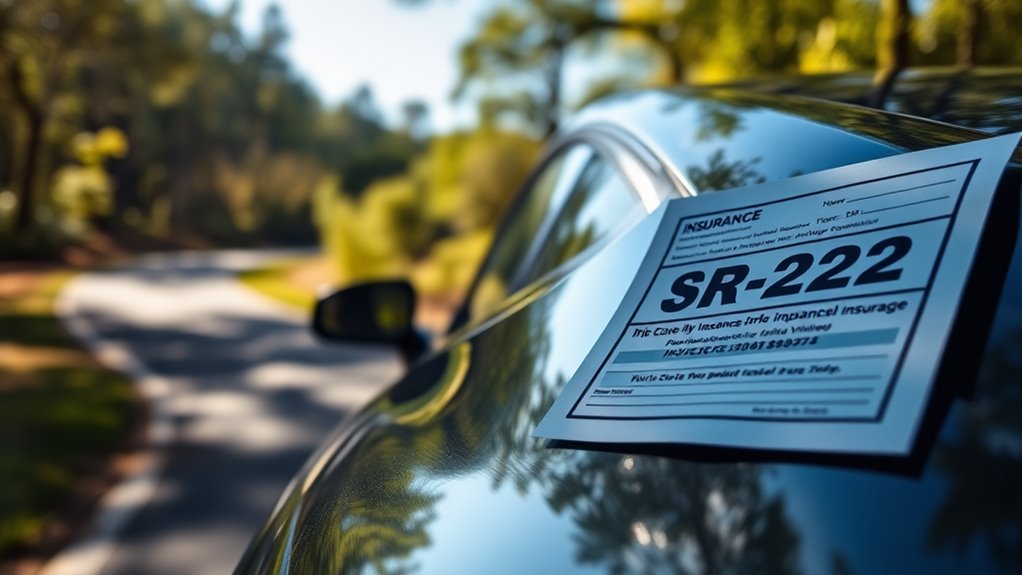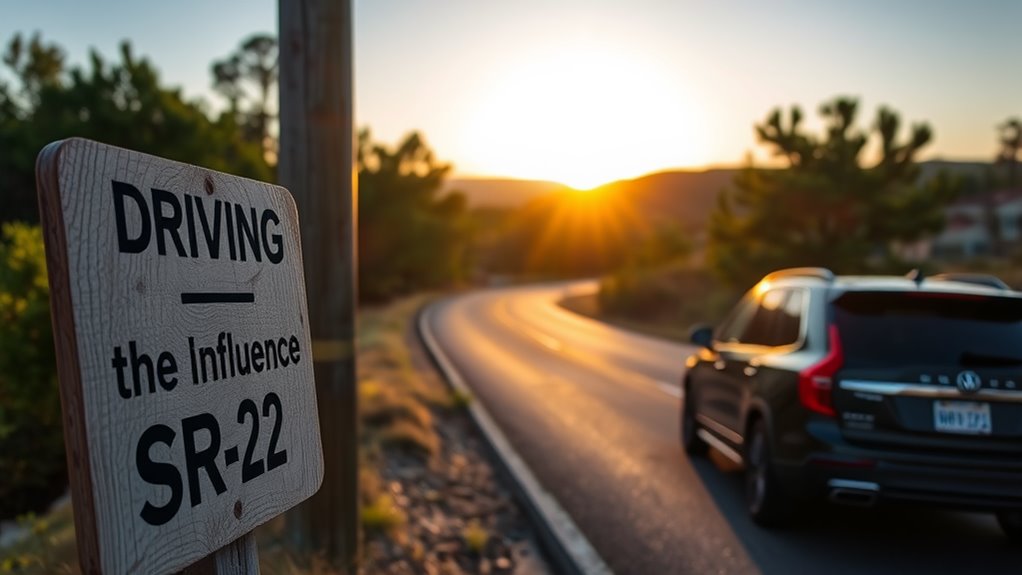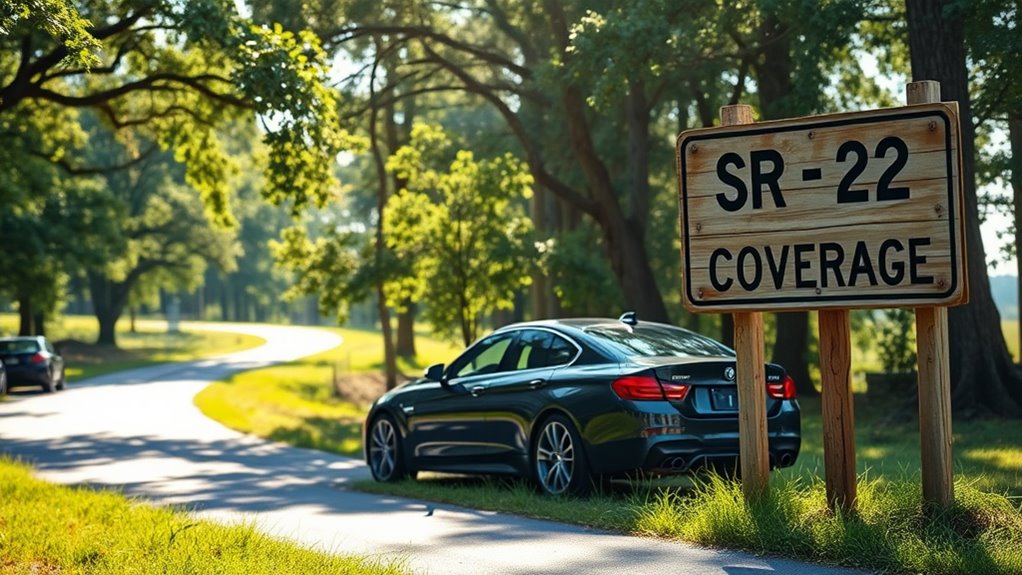If you’ve been labeled a high-risk driver in South Carolina, you might need to understand SR-22 insurance. This requirement can stem from serious violations like DUIs or driving uninsured. It’s essential to grasp the coverage requirements, eligibility criteria, and the filing process to avoid penalties. You’ll soon discover how maintaining this coverage can impact your driving privileges and insurance rates considerably. What steps should you take next to navigate this complex landscape?
Key Takeaways
- SR-22 insurance is required in South Carolina for high-risk drivers, often due to DUIs or serious traffic violations.
- The minimum liability coverage in South Carolina is 25/50/25, which must be maintained during the SR-22 period.
- An SR-22 must be filed and maintained for three years, with continuous coverage to avoid lapses.
- Non-compliance with SR-22 requirements can lead to immediate license suspension and significant financial penalties.
- Non-owner SR-22 policies are available, providing coverage for driving borrowed vehicles and typically at lower rates.
Understanding SR-22 Insurance

While steering through the complexities of auto insurance, understanding SR-22 insurance is essential for any driver facing specific legal requirements.
An SR-22 isn’t an insurance policy; it’s a form that verifies you have the minimum liability coverage mandated by your state. You typically need it after incidents like an uninsured accident, DUI, or driving with a suspended license.
The filing process involves your insurer submitting the SR-22 form to the state’s DMV. Depending on the offense, you may have to maintain it for three to five years. High-risk drivers are often required to file an SR-22 to prove they have continuous insurance coverage.
In some states, an SR-22 can also serve as an alternative to cash deposits, simplifying the proof of financial responsibility you need to keep your driving privileges intact.
Coverage Requirements Explained
Understanding the specific coverage requirements for SR-22 insurance in South Carolina is vital for compliance and financial protection. You’ll need to maintain minimum liability coverage of 25/50/25, which includes $25,000 for bodily injury per person, $50,000 for bodily injury per accident, and $25,000 for property damage per accident. Your SR-22 must be filed with the DMV and maintained for typically three years. It’s important to guarantee continuous coverage to avoid lapses that could impact your SR-22 status. Additionally, if you own multiple vehicles, each must be listed on your policy. Furthermore, your SR-22 Certificate of Insurance can be filed through ALIR, ensuring that your coverage is properly verified with the state.
Eligibility Criteria for SR-22
To qualify for SR-22 insurance in South Carolina, you must meet specific eligibility criteria that often stem from serious traffic violations.
Typically, you’ll need an SR-22 if your license has been suspended due to infractions such as DUIs or reckless driving. This form serves as proof that you’re maintaining the minimum required insurance coverage mandated by state laws.
Additionally, if you’ve had multiple traffic violations within a short time frame or failed to maintain insurance, you may also be required to file an SR-22.
Generally, this designation is aimed at high-risk drivers and is essential for demonstrating financial responsibility.
Common Triggers for SR-22 Filing

When it comes to SR-22 filings, certain violations stand out as common triggers.
A DUI or DWI conviction is a primary reason that forces you to file, along with the serious mistake of driving without insurance.
Understanding these triggers can help you navigate the path to reinstating your driving privileges more effectively.
DUI or DWI Convictions
DUI or DWI convictions often trigger the requirement for SR-22 insurance in South Carolina, making it crucial for affected drivers to navigate the consequences carefully.
After a DUI or DUAC conviction, you’ll typically need to maintain an SR-22 for three years, though this duration can vary based on the offense’s severity or court mandates.
Remember, a DUI can occur even if you don’t exceed the legal BAC limit. The DMV will notify you if an SR-22 is necessary, and you’ll need to select the appropriate insurance option.
If you have multiple violations, this can also necessitate an SR-22. Understanding these requirements is essential for maintaining your driving privileges and minimizing long-term costs.
Driving Without Insurance
Driving without insurance can lead to significant legal repercussions in South Carolina, often resulting in the need for an SR-22 filing.
If you’re caught driving an uninsured vehicle, you might face a 30-day license suspension, alongside accumulating daily fines of $5. A base fine of $200 for your first offense is common, not to mention potential reinstatement fees up to $400.
Repeat offenders could face harsher penalties, including jail time up to six months.
In addition, to reinstate your driving privileges, you’ll be required to file an SR-22 for a duration of typically three years. During this period, the DMV will continuously monitor your insurance status, ensuring compliance is non-negotiable.
SR-22 Filing Process Overview

Understanding the SR-22 filing process in South Carolina is essential if you’re maneuvering through the complexities of reinstating your driving privileges after certain violations.
First, you’ll need to secure a policy with minimum liability coverage of $25,000/$50,000/$25,000. Your insurance provider submits the SR-22 form electronically to the SCDMV, and you won’t receive a physical document.
Once filed, the SR-22 must remain active for a typical three-year period. If your coverage lapses, the SCDMV will automatically suspend your license.
Be aware that any updates to your policy need to be reported within 30 days. Finally, you may incur a one-time filing fee from your insurer, so budgeting accordingly is wise.
Costs and Premiums Associated With SR-22
While maneuvering the costs and premiums associated with SR-22 insurance in South Carolina, you’ll find that these expenses can greatly impact your budget.
On average, SR-22 insurance costs about $1,311 annually for minimum coverage and $2,486 for full coverage. Expect premiums to rise by 44% for minimum and 38% for full coverage compared to drivers with clean records.
Monthly premiums can range from $150 to $200, depending on your provider and driving history. Factors like the type of violation and your age notably influence these costs.
It’s crucial to compare rates from various providers, such as USAA and American National, to find the most affordable options that suit your needs.
Consequences of Non-Compliance
Failing to maintain your SR-22 insurance can lead to immediate license suspension and costly reinstatement fees.
You’ll also reset your filing requirements, meaning you’ll need to start the compliance process over again.
Additionally, financial penalties can accumulate quickly, placing a significant burden on your finances and driving record.
License Suspension Reinstatement
If you don’t maintain your SR-22 insurance, you’ll face immediate license suspension or revocation in South Carolina.
The consequences of non-compliance can be significant, impacting both your driving privileges and finances. Here’s what you need to know:
- Repeated offenses can lead to extended suspension periods.
- Insurance lapses are reported to the state, triggering penalties without warning.
- Reinstatement fees range from $100 to $500, adding to your financial burden.
- Extended SR-22 requirements may apply if you drive uninsured during the mandated period.
Understanding these consequences can help you stay compliant and avoid additional penalties.
Always keep your SR-22 insurance active to protect your driving privileges and finances.
Filing Requirement Reset
When you let your SR-22 insurance lapse, the consequences can reset your filing requirements and complicate your path to reinstating your driving privileges.
The South Carolina DMV requires continuous coverage to maintain your legal driving status. If your insurance lapses, it triggers an automatic suspension of your license and resets the three-year filing period.
Your insurance provider will notify the state of any lapses, leading to additional penalties and fines. Furthermore, you’ll need to reinstate your SR-22, which may increase your insurance rates.
To avoid these complications, make certain that your coverage remains uninterrupted throughout the mandated period, demonstrating financial responsibility and compliance with state laws.
Financial Penalties Imposed
Non-compliance with SR-22 insurance requirements can lead to significant financial penalties that impact your wallet and driving privileges. Here’s what you might face:
- Fines up to $200 for driving without insurance or substantial penalties for lapsing coverage.
- Reinstatement fees of up to $400 to regain your driving and registration privileges.
- SR-22 filing fees charged by insurance companies, increasing your overall costs.
- Higher insurance premiums due to the associated risks of needing an SR-22, which can strain your budget.
These financial repercussions emphasize the importance of maintaining compliance with SR-22 mandates.
Ignoring these requirements can quickly escalate into a costly situation, both monetarily and with regard to your driving rights.
Maintaining SR-22 Coverage

Maintaining SR-22 coverage requires diligent attention to your insurance policy and payment schedules, as any lapse can lead to automatic license suspension.
You must keep at least the state-mandated minimum coverage of 25/50/25, which includes $25,000 for bodily injury per person, $50,000 per accident, and $25,000 for property damage.
Higher premiums are common due to your high-risk status, and you can’t reduce your coverage during the three-year monitoring period.
Your insurer will electronically submit your SR-22 to the SCDMV, but if you change insurers, duplicate filings are necessary.
Timely premium payments are critical; there’s no grace period for late payments, and missed payments can result in immediate reporting to the DMV, jeopardizing your license.
Options for Non-Owner SR-22 Policies
For many drivers in South Carolina, securing a non-owner SR-22 policy is an essential step toward regaining driving privileges after a suspension.
This type of insurance is specifically designed for those who don’t own a vehicle but still need coverage. Here are some key options to evaluate:
- Liability Coverage: Provides protection when driving borrowed vehicles.
- Affordability: Generally less expensive than standard car insurance.
- Duration: Coverage typically lasts for three years, ensuring compliance.
- Filing Process: Your insurer will handle the SR-22 form submission to the DMV.
Finding Affordable SR-22 Insurance in South Carolina
How can you find affordable SR-22 insurance in South Carolina? Start by researching providers like American National, which offers the lowest minimum coverage rate at $46 per month.
For full coverage, Farm Bureau stands out at $1,946 annually, while Progressive’s rate is $2,740. Comparing quotes is vital, as costs can vary greatly among insurers.
Remember that an SR-22 typically increases your premiums by about $34 monthly. Utilize online quote tools and consider specialized agents for tailored advice.
Make sure you maintain continuous coverage for the required three years to avoid penalties. By understanding your options and diligently comparing rates, you can secure an affordable SR-22 policy that meets your needs.
Frequently Asked Questions
How Can I Check My SR-22 Status Online?
To check your SR-22 status online, visit your state’s DMV website. You’ll need to enter specific information, like your driver’s license number, and may require additional documentation for access to your status updates.
Can I Switch Insurers While Maintaining My SR-22?
Yes, you can switch insurers while maintaining your SR-22. Just guarantee your new insurer files the SR-22 certification promptly to avoid lapses in coverage, which could lead to legal complications or license issues.
What Happens if I Move Out of State?
When you move out of state, you need to guarantee your new insurer meets your previous state’s requirements. Failure to comply can lead to license suspension and complications with your driving privileges in the new state.
Are There Alternatives to SR-22 in South Carolina?
Yes, there are alternatives to SR-22. You can explore cheaper insurance options, improve your driving record, or consider non-owner policies if you don’t own a vehicle. Always compare rates from various providers for the best deal.
Will My SR-22 Affect My Credit Score?
Your SR-22 won’t impact your credit score directly; however, higher insurance premiums could strain your finances. Missing payments might lead to collections, which could indirectly affect your credit. Stay proactive in managing your payments.
Conclusion
Maneuvering the labyrinth of SR-22 insurance in South Carolina might feel like scaling Everest, but it’s essential for high-risk drivers. By understanding the coverage requirements and compliance consequences, you can avoid the treacherous pitfalls of penalties and soaring premiums. With diligent maintenance of your policy and exploring options, you can emerge unscathed from this challenging process. Remember, staying informed is your best ally in transforming a cumbersome obligation into a manageable, even empowering, experience.









